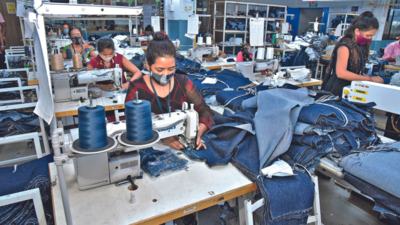- News
- City News
- ahmedabad News
- Denim makers embrace blends as cotton prices soar
Trending
This story is from May 22, 2022
Denim makers embrace blends as cotton prices soar
Come winter you may find branded jeans made of blended fabric and not pure cotton.

Picture used for representational purpose only
AHMEDABAD: Come winter you may find branded jeans made of blended fabric and not pure cotton. To address the issue of high prices of cotton and other raw materials and unable to pass on higher prices to their customers, a few denim manufacturers are taking to value-engineering denims by blending in other fibres. Cotton prices have gone as high as Rs 97,000 a candy at a time when manufacturers are facing other inflationary pressures as well.
Vinay Thadani, CEO, Vishal Fabrics Limited, said, “As cotton prices have gone up, we have begun moving towards blending other fibres such as lycra and polyester with cotton to reduce costs. Against 5% of our product portfolio, we are now aiming at 12% of our product mix being blends. Denim manufacturers are compelled to find cost-reducing measures.”
The case of Arvind Limited is similar, according to market sources. “High cotton prices have added pressure on manufacturers of denims. The denim division of Arvind is also focussed on value-engineering its products by blending cotton with different fibres. The idea is to not compromise on quality,” said a source privy to the development.
Industry players say in the Indian market, blended denims may be seen in jeans when the fall-winter collection is launched.
A lot of brands in foreign markets are readily accepting blended fabrics, which was not the case earlier. Manufacturers are going the extra mile to ensure quality is not compromised and the texture and feel of the fabric doesn’t change too much.
Several MSME denim manufacturers are also experimenting with blended fabrics. Saurav Jalan, director of a textile manufacturing company, said, “We are experimenting with blends and the response has been good over the past six months as clients are also in no position to raise prices. We’re exploring blends with polyester and other man-made fibres. This is helping bring down costs by as much as Rs 130 a kg, reducing dependence on cotton significantly.”
“Cotton prices in India have seen the steepest increase compared to other markets. Interestingly, in China, the increase in cotton prices has been minimal. This is limiting the competitiveness of Indian manufacturers, who are forced to value-engineer products,” said an industry source.
Vinay Thadani, CEO, Vishal Fabrics Limited, said, “As cotton prices have gone up, we have begun moving towards blending other fibres such as lycra and polyester with cotton to reduce costs. Against 5% of our product portfolio, we are now aiming at 12% of our product mix being blends. Denim manufacturers are compelled to find cost-reducing measures.”
The case of Arvind Limited is similar, according to market sources. “High cotton prices have added pressure on manufacturers of denims. The denim division of Arvind is also focussed on value-engineering its products by blending cotton with different fibres. The idea is to not compromise on quality,” said a source privy to the development.
Industry players say in the Indian market, blended denims may be seen in jeans when the fall-winter collection is launched.
Polyester blends, according to them, will not work well in the Indian climate.
A lot of brands in foreign markets are readily accepting blended fabrics, which was not the case earlier. Manufacturers are going the extra mile to ensure quality is not compromised and the texture and feel of the fabric doesn’t change too much.
Several MSME denim manufacturers are also experimenting with blended fabrics. Saurav Jalan, director of a textile manufacturing company, said, “We are experimenting with blends and the response has been good over the past six months as clients are also in no position to raise prices. We’re exploring blends with polyester and other man-made fibres. This is helping bring down costs by as much as Rs 130 a kg, reducing dependence on cotton significantly.”
“Cotton prices in India have seen the steepest increase compared to other markets. Interestingly, in China, the increase in cotton prices has been minimal. This is limiting the competitiveness of Indian manufacturers, who are forced to value-engineer products,” said an industry source.
End of Article
FOLLOW US ON SOCIAL MEDIA










